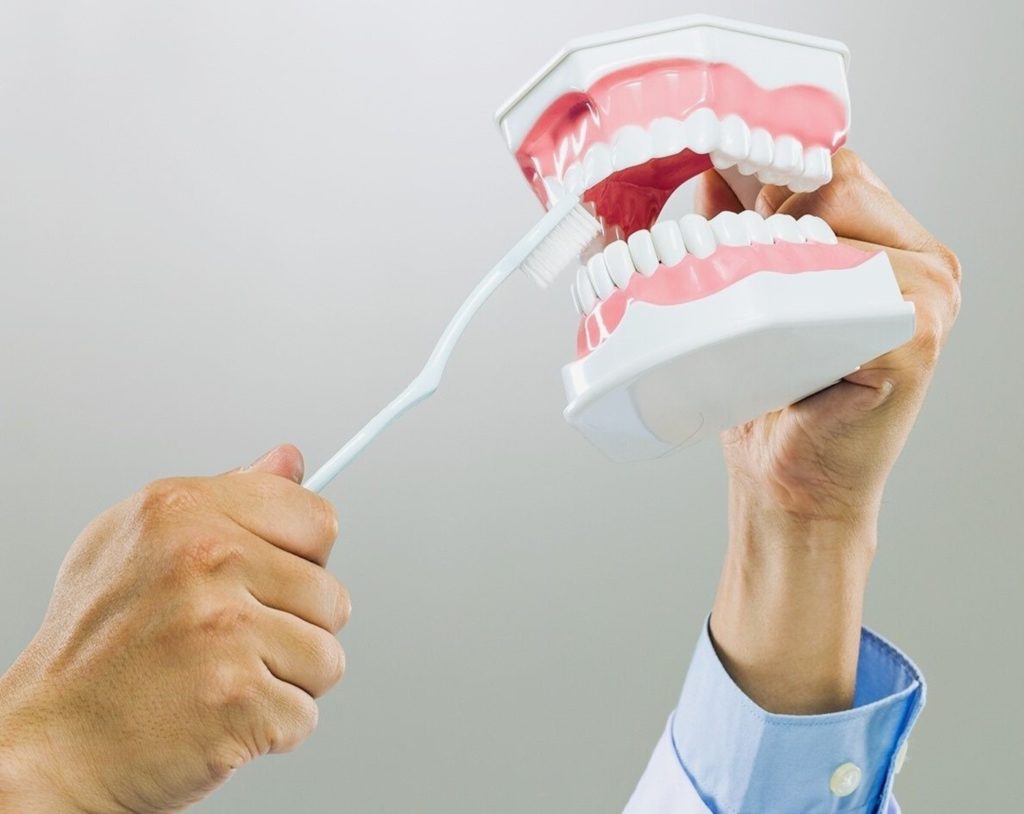Dentures are more than just a restorative dentistry option. They boost your confidence while allowing you to enjoy food better and speak more easily.
But here’s the truth — they feel pretty weird when you first get them.
Patients often wonder if their dentures will ever feel normal. The answer is yes, they will. Getting used to wearing dentures takes some time, and the adjustment period can be a little uncomfortable for new denture users. Here we will discuss what you can expect in these first few weeks and how you can get used to your new dentures faster.
What to Expect During the Adjustment Period
Whether you’re getting full or partial dentures, you can expect the following changes in your mouth.
Soreness and Discomfort
This is a new apparatus in your mouth, so when you wear your dentures for the first time, you will likely experience some gum irritation, soreness, and mild pain. This discomfort is due to the additional pressure your new prosthetics exert on your gums.
If you find yourself wondering if your dentures will ever feel normal, try to be patient. The worst of the soreness subsides within a week or two. You can ease the discomfort by rinsing your mouth with warm salt water.
Excessive Saliva
It’s not always talked about, but with new dentures, you can expect increased saliva production. Your body will confuse the dentures with food and respond accordingly by creating more saliva.
While getting used to wearing dentures, you can reduce excessive saliva by swallowing more often and avoiding sour or sugary treats. Citrus fruits like oranges, lemons, and grapefruits are snacks that increase your body’s saliva production. This problem is temporary and will resolve within a few days as your mouth adjusts to your new teeth.
Dentures Slipping
Another common problem is dentures slipping out of place. Your natural teeth are anchored to your jaw, but dentures need muscle power to stay put. The muscles in your mouth need to cooperate to hold them firmly, but there is a learning curve.
So your dentures might fall out when you laugh, eat, or cough. You can readjust them by gently biting down on them. As you continue wearing your dentures, they do feel more normal, and your muscles will adjust. You can also use denture adhesives to keep them in place.
Improper Fit
Your mouth is sensitive to change. So the first time you put your dentures on, you might feel they’re too big and bulky. Before getting used to wearing dentures, you might even feel like they’re pushing your lips forward and become self-conscious.
This improper fit may sometimes be due to a dentist’s error, but it’s most likely due to the strange new feel of dentures. Your dentures feeling bulky in the beginning is not unexpected. The sensation will become less noticeable as time passes and the dentures feel more normal.
Eating with dentures is difficult and awkward for new users. They may slip out of position, and pieces of food can get trapped under them. It will take some time to learn how to eat with them. It’s best to stick with softer foods until then.
Difficulty Eating
Eating will become easier as you get used to your dentures and practice chewing. Soon, you can dine out with your friends again without worrying about your dentures shifting.
Difficulty Speaking
You may also have trouble speaking with your new dentures. They will interfere with your speech by causing a lisp or preventing you from pronouncing certain sounds like s and f. Plus, they may cause clicking sounds or shift in place when you talk.
As you’re getting used to wearing dentures, you will find it’s easier to talk. This is a normal part of the process you can overcome with practice and learning to move your tongue around your new teeth.
After the Adjustment Period
All of these issues will resolve over time. However, you must be patient. For most people, the adjustment period will take up to 30 days. By this time, the soreness will be gone, there won’t be any more excess saliva, the dentures will stay in place, and you can eat and speak without a problem.
What if my dentures don’t ever feel normal?
If you don’t feel normal after the 30-day mark and you still have too much discomfort or difficulty eating and speaking, you should visit your dentist. There may be something wrong with the fit of your dentures.
How to Get Used to Your Dentures

Getting used to wearing dentures can be easier if you follow these suggestions.
Eat Carefully
Only eat soft foods like mashed potatoes and yogurt the first week after getting your dentures. As you start getting accustomed to your dentures, you can add other foods to your diet. Take small bites and chew with both sides of your mouth.
Practice Speaking
One of the best ways to get your dentures to feel normal is to practice. Dedicate some time to practice talking in private and in front of a mirror daily. You can even sing! Soon, you will be able to correct your pronunciation and sound natural when talking.
Use an Adhesive
A denture adhesive can hold your new teeth in place and reduce discomfort. Consult your dentist and pick the best denture adhesive to help you through the adjustment period.
Care For Your Dentures
Proper denture care is crucial to ensure your dentures’ longevity. So learn to care for your dentures. Don’t forget your regular oral hygiene, including brushing your gums, tongue, and the roof of your mouth.
Let Your Mouth Rest
Don’t wear your dentures 24/7 unless your dentist says so. Your gums and mouth tissues need time to rest and recover to remain healthy. So remove your dentures before going to sleep.
Ensure Your Dentures’ Success With The Dental Health Group
We promise, your dentures will feel normal eventually. Getting used to wearing dentures will take time, but you will get there.
If you have questions or concerns about your dentures in the Greater Los Angeles area, the Dental Health Group can help. Dr. Erwin Abad specializes in denture care and can assist patients with removing any irritation or pain from their dentures. Your care is our passion. Schedule your appointment today and receive the best care possible.


